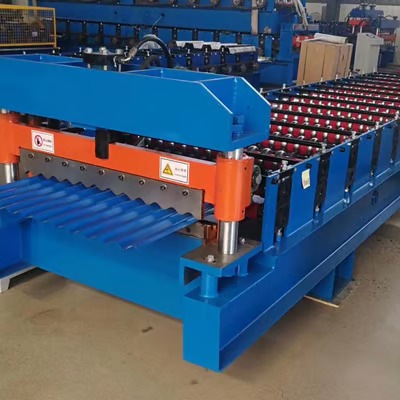Custom Roll Forming Machine: A Comprehensive Guide to the Ultimate Manufacturing Solution
Introduction
A custom roll forming machine is a versatile and efficient manufacturing solution that allows businesses to create customized metal profiles with precision and speed. This article will explore the various aspects of custom roll forming machines, including their benefits, applications, working principles, key components, and factors to consider when choosing one. Whether you are a manufacturing professional or simply curious about the capabilities of these machines, this guide will provide you with valuable insights into the world of custom roll forming.
The Benefits of Custom Roll Forming Machines
Custom roll forming machines offer a wide range of benefits for manufacturers in various industries. These benefits include:
- Cost-effectiveness: Custom roll forming machines are designed to maximize material usage and minimize waste, resulting in significant cost savings over time.
- High production speed: These machines can produce large quantities of high-quality metal profiles in a short amount of time, improving overall productivity.
- Flexibility: With custom roll forming machines, manufacturers have the freedom to create profiles of different sizes, shapes, and complexities, catering to specific requirements.
- Precision: Roll forming technology ensures consistent and accurate results, allowing for tight tolerances and precise specifications.
- Strength and durability: The roll forming process enhances the structural integrity of metal profiles, making them highly resistant to deformation and damage.
Applications of Custom Roll Forming Machines
Custom roll forming machines find applications in various industries, including:
- Construction: These machines are widely used in the construction industry for manufacturing metal building components, such as roof panels, wall studs, and window frames.
- Automotive: Custom roll forming machines play a crucial role in producing automotive parts, such as bumper beams, door sills, and chassis components.
- Appliances: Manufacturers of appliances rely on custom roll forming machines to create components like refrigerator shelves, oven racks, and washing machine parts.
- Furniture: The furniture industry benefits from custom roll forming by using it for manufacturing metal chair frames, table legs, and shelving systems.
- Energy and renewables: Custom roll forming machines are utilized for producing solar panel frames, wind turbine components, and other renewable energy system parts.
How Custom Roll Forming Machines Work
Custom roll forming machines use a continuous bending process to transform a flat metal strip, known as a coil, into a desired cross-sectional profile. The key steps involved in this process are:
- Material feeding: The metal coil is fed into the roll forming machine, where it passes through a series of rolls.
- Roll forming: As the metal strip moves through the rolls, it gradually takes the shape of the desired profile. Each set of rolls performs a specific bending or forming operation.
- Cutting: Once the metal strip has taken the desired shape, it is cut to the required length using a flying cutoff press or a post-cut shear.
- Finishing operations: Additional finishing operations, such as punching, notching, embossing, or welding, can be performed to further customize the profile.
- Packaging and stacking: The finished profiles are then packaged and stacked for transportation or further processing.
Key Components of Custom Roll Forming Machines
A custom roll forming machine consists of several key components that work together to ensure the smooth operation of the manufacturing process. These components include:
- Uncoiler: The uncoiler holds and feeds the metal coil into the roll forming machine.
- Roll forming stands: These stands consist of a series of rolls that shape the metal strip into the desired profile.
- Drive system: The drive system provides the necessary power and control to move the metal strip through the roll forming stands.
- Cutting system: The cutting system, which can be a flying cutoff press or a post-cut shear, cuts the formed profiles to the required length.
- Control panel: The control panel allows operators to monitor and adjust various parameters of the roll forming process, ensuring optimal performance.
Factors to Consider When Choosing a Custom Roll Forming Machine
When selecting a custom roll forming machine for your manufacturing needs, it is essential to consider the following factors:
- Production requirements: Determine the desired production capacity and profile complexity to choose a machine that can meet your specific needs.
- Material compatibility: Ensure that the machine is compatible with the types of metals or alloys you intend to use for roll forming.
- Tooling flexibility: Check if the machine allows for quick and easy tooling changes to accommodate different profiles.
- Automation options: Consider the level of automation offered by the machine, as it can significantly impact productivity and efficiency.
- Supplier reputation: Research the reputation and reliability of the machine supplier to ensure quality equipment and excellent after-sales support.
Conclusion
Custom roll forming machines are a game-changer for manufacturers looking to produce customized metal profiles with precision, speed, and cost-effectiveness. With their numerous benefits, wide-ranging applications, and efficient working principles, these machines have become an indispensable manufacturing solution across various industries. By understanding the key components and factors to consider when choosing a custom roll forming machine, businesses can harness the full potential of this technology and stay ahead in today's competitive market.

